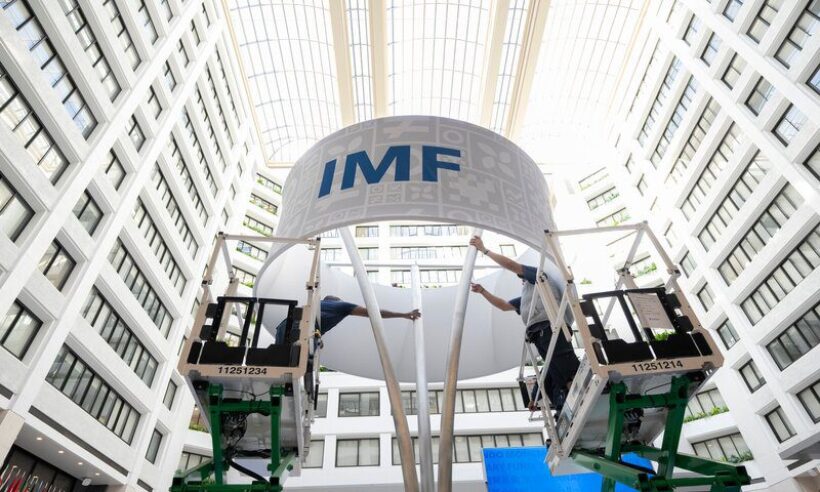After Colombia’s Credit Line Suspended, President Petro Ends IMF Standby Financing Arrangement
In a significant development for Colombia’s economy, the country has canceled its Flexible Credit Line (FCL) with the International Monetary Fund (IMF). The move comes after the IMF suspended Colombia’s access to the funds in April 2025 and follows a critical assessment of the nation’s fiscal health, raising concerns among economists and political opponents about the country’s financial stability and credibility on the world stage.
IMF Cites “Considerable” Fiscal Weakening
The decision was formalized following the conclusion of the IMF’s 2025 Article IV consultation on September 29, 2025. The IMF’s Executive Board released a sobering assessment, noting that while economic growth has strengthened and inflation is easing, significant challenges remain.
The core of the IMF’s concern lies in Colombia’s public finances. The report highlights a “widening fiscal deficit and rising debt levels,” which have resulted in higher borrowing costs (elevated sovereign spreads) and weak private investment amid “lingering concerns and uncertainties over the direction of policies”.
A key point of contention is the Colombian government’s decision in June to invoke an escape clause, suspending its fiscal rule through 2027. The IMF board stated that due to “repeated fiscal slippages and the temporary suspension of the fiscal rule—a key policy anchor,” Colombia’s fiscal policy and framework have “deteriorated” and “weakened considerably” since the FCL was requested in 2024. Consequently, the country no longer meets the “very strong” assessment required for continued qualification for the FCL.
The IMF warned that further delays in fiscal consolidation could undermine investor confidence and potentially trigger a “sudden stop in capital inflows”. The organization urged Colombian authorities to implement a credible and decisive consolidation plan to “re-anchor expectations, lower borrowing costs, and improve the overall policy mix”.
Economic Projections and Risks
The IMF projects Colombia’s real GDP will grow by 2.5% in 2025, with inflation gradually easing to around 4.5% by the end of the year. However, it forecasts a challenging fiscal landscape, with the central government deficit reaching 7.1% of GDP in 2025 and gross public debt peaking at 62.3% in 2027.
The report also outlined significant external risks, including tighter global financial conditions, geopolitical tensions, and stricter immigration policies, which could disrupt exports, foreign direct investment, and remittances.
Government Defends Decision, Cites Strong Reserves
Colombia’s central bank, Banco de la República, announced the cancellation of the FCL, which was originally approved in April 2024 for two years and amounted to approximately $8.1 billion.
The bank stated the decision was based on the country’s adequate international liquidity levels, with international reserves reaching $65.5 billion. This position was strengthened by a reserve accumulation program and portfolio returns totaling $6 billion during 2024 and 2025. Central bank governor Leonardo Villar asserted that the country’s credit perception will not be negatively affected, stating that “the level of international reserves is strong enough to have supported the decision” and will not have “relevant financial implications”.
The bank clarified that the cancellation does not impact the payment schedule for a disbursement made in December 2020. As planned, the final payment is due in December 2025.
Critics Warn of Economic Fallout
The move has drawn sharp criticism from political opponents and economists, who view it as a serious blow to Colombia’s financial standing.
Mauricio Cárdenas, former finance minister and a presidential candidate, harshly questioned the decision, describing the FCL as a beneficial “cushion” for the country. He warned that it sends a negative message to international investors, particularly in a context of rising credit costs. “Colombia is paying a 13% interest rate on its financing, when 10 years ago it was 6% or 7%,” Cárdenas stated, adding that these higher costs reduce funds available for social investment.
#Economía| El exministro de Hacienda y candidato presidencial, Mauricio Cárdenas Santamaría, cuestionó con dureza la decisión del Gobierno Petro de renunciar a la Línea de Crédito Flexible con el Fondo Monetario Internacional (FMI).
“Estamos muy mal. En 24 horas, el ministro de… pic.twitter.com/LVsMnscpmw
— Jean-Pierre Serna (@jpserna) October 1, 2025
Economist Adriana Oviedo noted that the exit from the FCL “crystallizes a problem of fiscal credibility in Colombia”. She argued that without this external “shielding,” risk agencies will now focus more intensely on the country’s deficit and rigid government spending. In her view, the government is now “forced to make a non-discretionary adjustment to resume the debt path”.
La salida de la LCF del FMI cristaliza un problema de credibilidad fiscal en Colombia. Sin el "blindaje" externo, el foco de agencias de riesgo se centra en el déficit y la rigidez del gasto.
El Gob. se ve forzado a un ajuste no discrecional para reanudar la senda de la deuda. https://t.co/Q1ugSNuS1W
— Adriana Oviedo (@Adri_OviedoLL) September 30, 2025
Former Vice President Marta Lucía Ramírez characterized the move as “a step into an economic abyss,” claiming it distances Colombia from the stability achieved by previous administrations with the FCL’s support. Similarly, former consul
El informe del FMI advierte: déficit al 6.7%, deuda al 61.3%, y vulnerabilidad de la economia colombiana por la caída de commodities. La FCL legado del anterior gobierno,nos dio seguridad financiera. Petro nos lleva al borde del precipicio. ¡Colombia merece mejor!…
— Marta Lucía Ramírez. (@mluciaramirez) September 30, 2025
Former consul Claudia Bustamante called the decision “irresponsible,” warning that “without the backing of the IMF, Colombia loses international confidence, so there is more risk, more cost and more economic uncertainty”.
IMF Photo/Melissa Lyttle/Facebook.




























